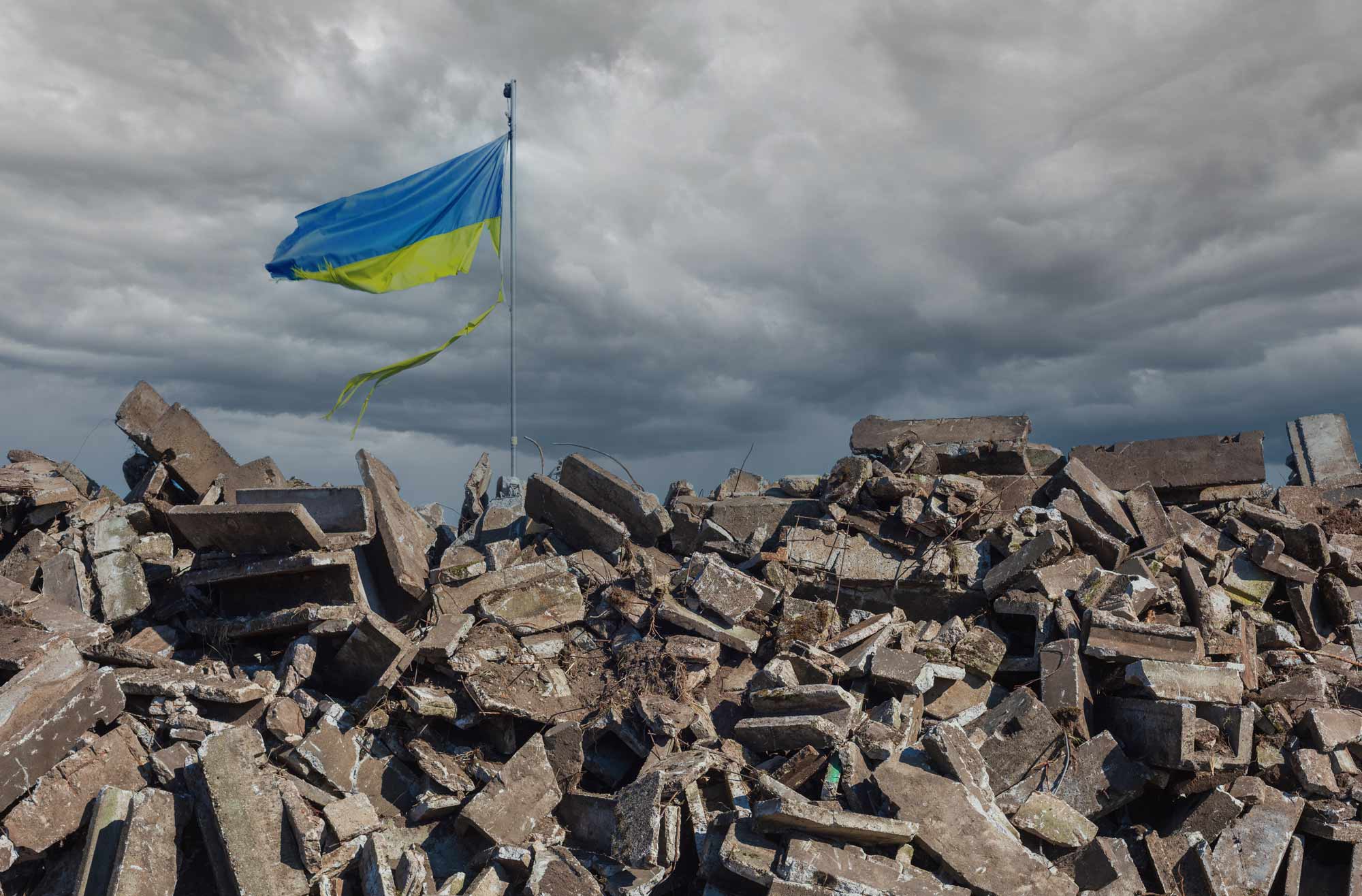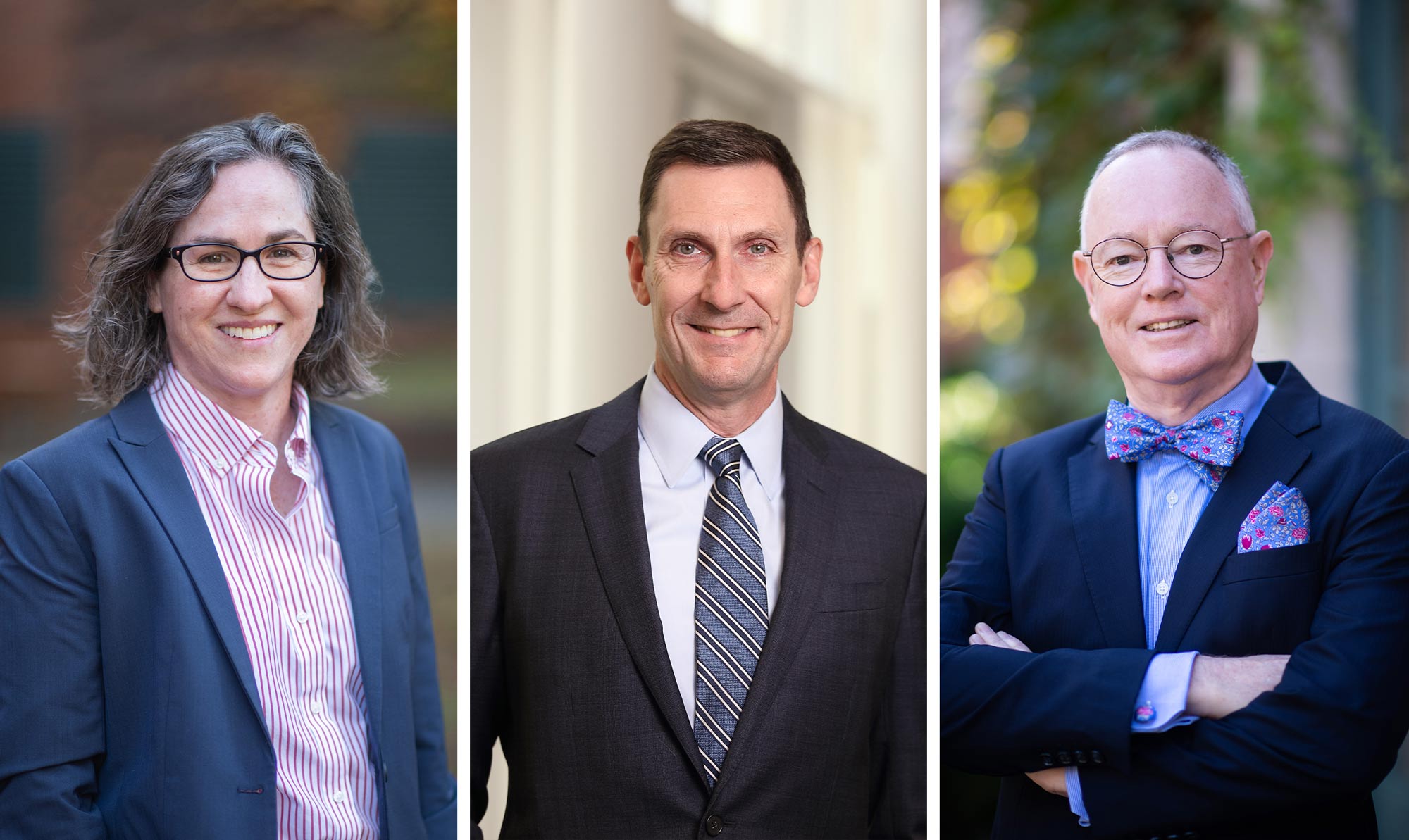Ashley S. Deeks, a member of the U.S. State Department’s Advisory Committee on International Law, recently served as White House associate counsel and deputy legal adviser to the National Security Council while on leave from the Law School. She is the Class of 1948 Professor of Scholarly Research in Law.
Thomas B. Nachbar, the F.D.G. Ribble Professor of Law, teaches and writes on cybersecurity. He is affiliated with the Law School’s National Security Law Center and the National Security Policy Center at the Frank Batten School of Leadership and Public Policy. Nachbar is also a judge advocate in the U.S. Army Reserve.
Paul B. Stephan is an expert on international business, international dispute resolution and comparative law, with an emphasis on Soviet and post-Soviet legal systems. A frequent traveler to Russia, Stephan is the John C. Jeffries, Jr., Distinguished Professor of Law; the David H. Ibbeken ’71 Research Professor of Law.
Q. What’s been the biggest surprise about the war so far?
Deeks: The quantity and types of equipment that the West, including the U.S., has ultimately been willing to provide Ukraine. At the start of the conflict, the U.S. and other NATO countries seemed keenly focused on only providing assistance that Russia would not see as provocative. But as time has passed, the U.S., the U.K., Poland and even Germany have authorized tanks, long-range missile launchers and lethal unmanned aerial vehicles. Last week the U.K. indicated it may even consider sending fighter jets to Ukraine. These states presumably are keeping a close eye on their intelligence to discern Putin’s red line for responding militarily against NATO states. It is notable that the assistance to date hasn’t crossed it.
Nachbar: The biggest surprise of the war is the degree to which Ukraine has succeeded in a largely conventional fight with Russia. Many – especially Russia itself – seem to have predicted a quick and decisive conventional conflict, likely followed by a protracted insurgency. Instead, this has been a war that has featured artillery and armor as much as it has low-intensity combat and newer technologies.
Stephan: For me, and I think for many people, it’s been the unity and resilience of the Ukrainian government as it confronts the challenge of the invasion, and the poor planning and general fecklessness of the Russian military campaign. The Ukrainian armed forces learned from the low-level war fought in the Donbas region of Ukraine in the eight years before this invasion. The Russian military, which had not conducted significant land operations since the two Chechen wars at the end of the 20th and start of the 21st centuries, seemed not to have learned so much.
Q. What has been the impact of cyber warfare and cybersecurity in this war?
Nachbar: It is hard to know how prominent a role cyber has played, but for the Russians, it seems to have largely been a matter of using cyber to attack civilian rather than military targets – perhaps because the Ukrainian military is not a particularly high-tech force. But attacking civilian targets is a violation of the law of armed conflict if the targets are not being used for military purposes, so if Russia is determined to deploy its cyber capability, and the only soft cyber targets are civilian ones, the Russians could be drawn into violating the law of armed conflict. That would be an interesting consequence of the growth of Russia’s cyber capabilities.
Q. What effect do you think the war will have on Russia, economically and politically?
Stephan: Economically, the key question is how quickly young, talented Russian nationals, many working in the tech sector and other high-skill areas of the economy, come home after the war. The immediate impact of the economic sanctions has not been so bad for Russia, but giving up any place in the knowledge economy – even with fossil fuel exports to the Global South –does not strike me as a viable long-term plan. The political effects on Russia are complex and likely to be noisy. Russia has sought to deepen its ties to some countries in the Global South, but it has fundamentally adverse interests with China that limit cooperation beyond fulminating against the West.
Domestically, I am pessimistic about the possible political outcomes over the next five to 10 years. The worst-case scenario would be a fracturing of governance and power, as Russia experienced in the Yeltsin years (essentially the ’90s). A change of leadership will occur eventually, but I am not sure that will produce a change of regime. I think the chances of a liberal, Western-oriented government coming to power are very low. We in the West have hoped for such an outcome since Peter the Great in the late 17th century, but so far all hopes raised have been bitterly disappointed.
Q. What are the prospects for reparations?
Deeks: I think the prospects for Russia making reparations – that is, paying states or individuals injured as a result of its further invasion of Ukraine – are very limited. There have been a few examples of claims commissions set up after conflicts, such as the U.N. Compensation Commission for Iraq to compensate Kuwait and others for Iraq’s invasion. And Germany paid reparations at the end of both World Wars I and II. In November 2022, 94 members of the U.N. General Assembly voted in favor of a nonbinding resolution calling for Russia to be held responsible for the invasion, including by paying reparations. But there are no obvious tribunals that could impose reparations on Russia, and Russia has a veto in the Security Council. Without Russia’s consent to make reparations, I am not optimistic.











